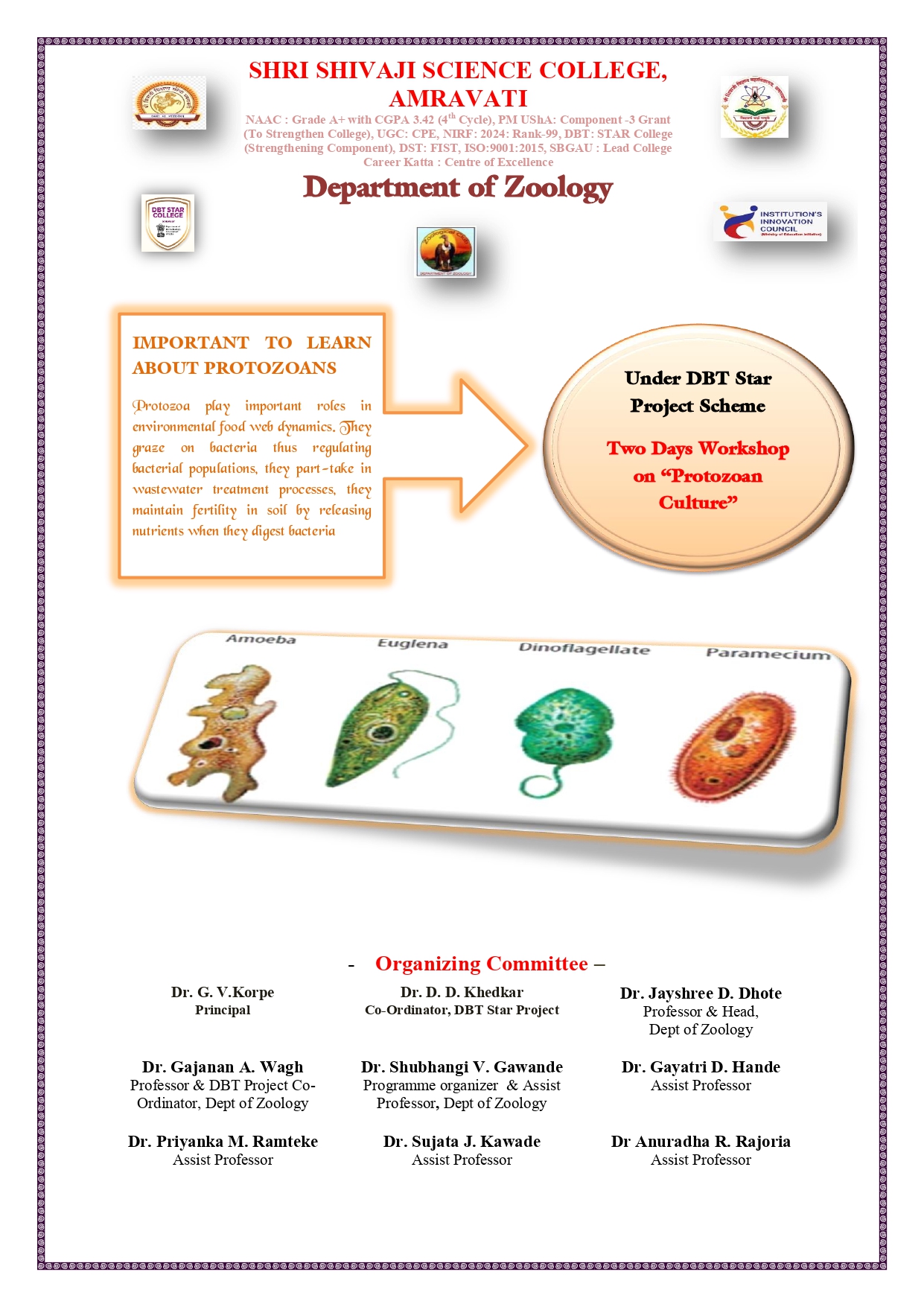SHRI SHIVAJI SCIENCE COLLEGE, AMRAVATI
DBT STAR COLLEGE PROJECT ACTIVITY
ACTIVITY REPORT

Two Days Workshop on“Protozoan Culture”
Activity Dates: 30/09/2024 to 01/10/2024
Type of Activity: Students Workshop
Organizing Department: Department of Zoology
Program Coordinators: Dr. G. A. Wagh, Dr. S. V. Gawande
Head of the Department: Dr. J. D. Dhote
External Collaborator (if any): Nil
Objectives:
- 1. To know the procedure of Paramecium Culture & observe the live movements
- 2. To isolate, cultivate, and maintain Protozoa in laboratory settings.
- 3. To study the biology, physiology of Protozoa .
- 4. To understand the interactions between Protozoa and their environment, hosts, or other microorganisms.
- To study the behaviour of Protozoa.
No of Beneficieries: 116
Classes Involved: College Students of B.Sc. I
Venue of the Activity: Department of Zoology, ShriShivaji Science College, Amravati
Activity Report:
Shri Shivaji Science College, Amravati is making its valuable contribution in creating bright citizens by achieving the comprehensive development, heritage and cultural progress of the country. Continuing this tradition, Department of Zoology organized Two days workshop on the topic of "Protozoan culture" for B.Sc. I Students (2024-25) from dated 30thSeptember to 1st October2024 under the guidance of Dr. G.V. Korpe, Principal, Shri. Shivaji Science College, Amravati, Dr. J. D. Dhote, Head, Department of Zoology , Dr. D.D. Khedkar, Coordinator, College DBT Star Project, Dr. G. A. Wagh, Coordinator Department DBT Star Project, Dr. S. V. Gawande organizing Committee member. All the Respected faculty members of Department of Zoology were present for this programme.
Total 116 students Zoology offering subject with the combination of microbiology, environmental science, biotechnology, and botany participated in this activity. Meanwhile, all the students participated spontaneously and enjoyed this event in studious atmosphere. This student hands on training aimed to know the procedure of Paramecium Culture & observe the live movements Students learn how protozoa are formed and how they increase soil fertility by feeding bacteria and regulating their population, and they also aid in composting. The students were guided about protozoans, their habits, where they are found and where they grow. Dr. Shubhangi Gawande explained the students how to grow Amoeba, Paramecium, Euglena and Vorticella in water, how to prepare their samples, how to culture them. Students then studied how protozoans move by creating cultures.In this regard, Dr. J. D. Dhote, Head, Department of Zoology, made the students understand the side effects and importance of protozoan culture. Dr.G. A. Wagh, Department Coordinator, DBT Star Project had given the introduction of Protozoan culture and he also introduced the students about benefits of DBT activity.
Methology of Culture:
Paramecium is found in freshwater rich in decaying organic matter. The culture of Paramecium is one of the easiest among Protozoa as it reproduces very rapidly. Take 15-20 grains of wheat and some hay and boil them in 500 ml of water for a few minutes. Allow it to cool down. Afterwards collect some pond water having submerged leave containing some Paramecia. Add this pond water to culture solution. In a few days Paramecium will appear in it along with some bacteria.
Amoeba: It is the most satisfactory and simple culture medium for Amoeba. To prepare the medium 500 ml of water is taken in a flask and 10-25 grains of wheat and some hay is added to it and boiled so that the starch will be extracted. Allow this water to cool down. Now collect some pond water along with decayed weeds and filter it through a milling cloth piece and add the residue which contains the maximum number of Amoebae to starch solution. Leave it for some days. In this solution Amoebae multiplies actively and can be obtained in abundance.
Euglena is found in abundance in pond waters having rich nitrogenous waste matters. Euglena can be cultured easily as it needs little attention and requires plenty of food and light. Take a medium-sized battery jar and fill it with water and add to it 100 gms of wheat or rice or some hay. Keep this solution near the base of a window so that sun rays do not fall directly and leave it for 7 days. Now add to it some pond water containing Euglena. (The presence of Euglena in pond water can be discerned with the help of microscope). In two weeks the water will be covered with a scum containing large number of Euglena.
Vorticella. Take 0.5 gm of mashed hard boiled yolk and add to it 750 ml of distilled water. Allow it to stand for two days and then filter it through cotton. Take 100 ml of filtrate in a petridish and introduce to it few Vorticellas along with the weed. Within two weeks Vorticella multiplies and is found abundantly in the culture
Outcomes:
- 1. Students learn the procedure of Paramecium Culture & will observe the live movements of Paramecium
- 2. Enhanced understanding of Protozoan biology and ecology
- 3. Development of laboratory skills and techniques
- 4. Contribution to One Health initiatives (human, animal, and environmental health)
- 5. Promoting public awareness and education on protozoan diseases
Photos:
 Lab Activity: Practical Demonstration I |  Lab Activity: Practical Demonstration II |
 Interaction with Students |  Students: Lab Activity |
 Activity Result |  Activity Result |
Attendance Sheet:
 |
 |
 |